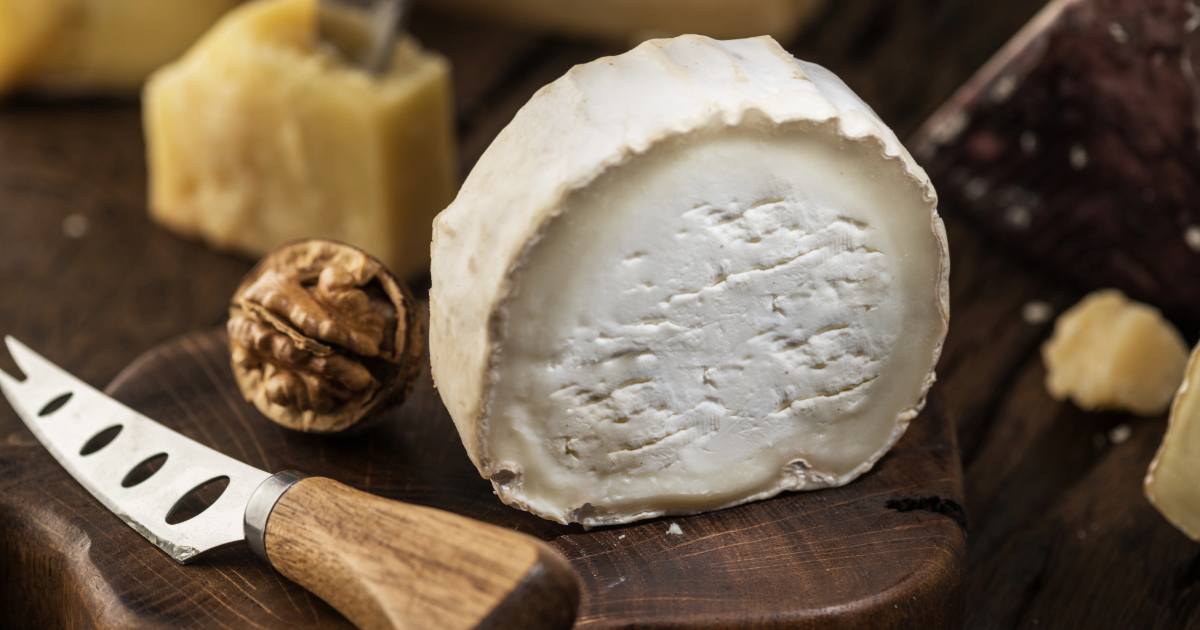Goat cheese and cheddar cheese both have their passionate fans.

But when it comes to nutrition, is one better than the other?
Nutrient Content
Let's start by looking at the basic macronutrients - calories, carbs, fat and protein:
Calories
Both goat cheese and cheddar cheese are high in calories, but cheddar packs slightly more:
- Cheddar cheese: 404 calories per 100g
- Goat cheese: 364 calories per 100g
So if limiting calories is your priority, goat cheese has a small advantage.
Fat
The two cheeses have broadly similar amounts of total fat, though cheddar cheese edges out goat cheese:
- Cheddar cheese: 33.3g of fat per 100g
- Goat cheese: 29.8g of fat per 100g
However, goat cheese actually contains more saturated fat than cheddar:
- Goat cheese: 20.6g saturated fat per 100g
- Cheddar cheese: 18.9g saturated fat per 100g
So for heart health, cheddar may be slightly better.
Carbs
Both cheeses are extremely low in carbs, but goat cheese contains hardly any:
- Goat cheese: 0.12g carbs per 100g
- Cheddar cheese: 3.1g carbs per 100g
So goat cheese wins for very low-carb diets like keto.
Protein
The two cheeses have similar protein content by weight. Cheddar cheese just edges out goat cheese:
- Cheddar cheese: 22.9g protein per 100g
- Goat cheese: 21.6g protein per 100g
So for high protein, cheddar is slightly better. But both offer plenty of protein punch.
Key Takeaway: For calories and fat, cheddar cheese is higher than goat cheese. But goat cheese contains more saturated fat. Goat cheese is extremely low in carbs while cheddar offers a little more protein.
Vitamin A
Goat cheese contains more vitamin A than cheddar cheese:
- Goat cheese: 407 μg per 100g
- Cheddar cheese: 337 μg per 100g
So if you want to protect your vision and support a healthy immune system, goat cheese may be preferable.
Calcium
Both types of cheese are great sources of bone-building calcium, but cheddar is higher:
- Cheddar cheese: 710mg per 100g
- Goat cheese: 298mg per 100g
So for strong teeth and bones, cheddar cheese delivers more calcium.
B Vitamins
B vitamins help convert our food into energy and keep the body functioning optimally. Goat cheese provides more B1, B2 and B3. But cheddar cheese is richer in B12 and folate:
| Vitamin | Goat Cheese | Cheddar Cheese |
|---|---|---|
| B1 | 0.072mg | 0.029mg |
| B2 | 0.676mg | 0.428mg |
| B3 | 1.148mg | 0.059mg |
| B12 | 0.22μg | 1.1μg |
| Folate | 2μg | 27μg |
So it's a split decision - choose based on which specific B vitamins you want more of.
Iron
Goat cheese absolutely trounces cheddar cheese when it comes to iron content.
- Goat cheese: 1.62mg per 100g
- Cheddar cheese: 0.14mg per 100g
Iron carries oxygen around the body, boosts immunity and supports energy levels. So for healthy blood and preventing anemia, goat cheese is the clear winner.
Selenium
On the flip side, cheddar cheese blows goat cheese out of the water for selenium:
- Cheddar cheese: 28.5μg per 100g
- Goat cheese: 3.8μg per 100g
Selenium supports thyroid health, fertility and your immune defense. It also protects cells from damage. So cheddar cheese delivers far more selenium.
Other Nutrients
Beyond the major players, goat cheese contains more potassium and copper, while cheddar cheese provides more zinc and phosphorus. But the differences aren't huge.
| Nutrient | Winner |
|---|---|
| Vitamin A | Goat cheese |
| Calcium | Cheddar cheese |
| B vitamins (except B12 & folate) | Goat cheese |
| Iron | Goat cheese |
| Selenium | Cheddar cheese |
| Zinc | Cheddar cheese |
| Phosphorus | Cheddar cheese |
Key Takeaway: Goat cheese wins for vitamin A, B vitamins (except B12 and folate) and iron. Cheddar cheese is higher in calcium, selenium, zinc and phosphorus.
Lactose and Digestibility
Lactose intolerance is common, affecting around 65% of the global population in adulthood. Since goat cheese is lower in lactose than cow's milk cheddar, it may be easier to digest for lactose intolerant folks.
Some experts also believe goat cheese is gentler on digestion in general thanks to:
- Smaller fat molecules
- Different protein variants
- Anti-inflammatory fatty acids
So while evidence is limited, goat cheese may get the edge for digestive comfort.
Cost
Goat cheese is generally more expensive than cheddar cheese. You can expect to pay $15-25 per pound for goat cheese versus $3-15 per pound for quality cheddar.
Of course, costs vary hugely based on factors like:
- Brand
- Age
- Artisanal versus mass-produced
But pound for pound, goat cheese usually costs more than cheddar.
Taste and Texture
Flavor and texture preferences are highly personal. But in general:
- Goat cheese is tangy, tart and earthy. It tends to be soft, creamy and spreadable when fresh, turning firmer and crumblier as it ages.
- Cheddar cheese has a range of flavor profiles from mild to sharp. It's smooth and firm in texture. Aged cheddar becomes intensely savory, nutty and crystalline.
So if you like strong, complex flavor and a crumbly texture, aged goat cheese may suit you. If you prefer milder taste and creamy smoothness, young cheddar is a good bet.
Cooking Properties
Both cheeses can be excellent for cooking. Cheddar is versatile in dishes like:
- Sandwiches
- Burgers
- Mac and cheese
- Soups
- Sauces
Meanwhile, goat cheese shines in:
- Salads
- Appetizers
- Pizzas
- Pastas
- Vegetarian dishes
- Breakfast
So choose based on the types of recipes you cook most. You really can't go wrong with either cheese in the kitchen.
Key Takeaway: Goat cheese may be easier to digest and better tolerated by lactose intolerant individuals. But it comes with a higher price tag than cheddar cheese. The two cheeses have quite different flavors and textures.
| Factor | Goat Cheese | Cheddar Cheese |
|---|---|---|
| Digestibility | ✅ Easier | ❌ Harder |
| Cost | ❌ Pricier | ✅ Cheaper |
| Taste | ✅ Tangy, tart | ✅ Mild to sharp |
| Texture | ✅ Creamy to crumbly | ✅ Smooth to crystalline |
| Factor | Goat Cheese | Cheddar Cheese |
|---|---|---|
| Calories (per 100g) | 364 | 404 |
| Fat (per 100g) | 29.8g | 33.3g |
| Saturated Fat (per 100g) | 20.6g | 18.9g |
| Carbs (per 100g) | 0.12g | 3.1g |
| Protein (per 100g) | 21.6g | 22.9g |
| Vitamin A (per 100g) | 407μg | 337μg |
| Calcium (per 100g) | 298mg | 710mg |
| Iron (per 100g) | 1.62mg | 0.14mg |
| B Vitamins | Higher (except B12 & folate) | Higher B12 & folate |
| Selenium (per 100g) | 3.8μg | 28.5μg |
| Digestibility | Easier | Harder |
| Lactose Content | Lower | Higher |
| Price | Pricier | Cheaper |
Which Cheese Should You Choose?
Based on the comparisons above, here are some guidelines on which cheese may suit you better:
Choose goat cheese if you want:
- Maximum nutrition - it edges out cheddar cheese in some key vitamins and minerals
- Iron and vitamin A - it's far higher in these nutrients
- Lowest lactose - less than cheddar if you are sensitive
- Tangy flavor and spreadable texture - it has characteristic tartness and creaminess
- Specialty ingredient - it makes salads and appetizers shine
Pick cheddar cheese if you prefer:
- More affordable price - it's usually cheaper than goat cheese
- Familiar flavor - aged cheddar has that quintessential savory, nutty taste
- Smooth texture - young cheddar is mild and nicely meltable
- Maximum calcium - it delivers the most bone-building mineral
- Selenium and B12 - it's a superior source of these nutrients
Either cheese works well if you want:
- High protein - both offer over 20g protein per 100g serving
- Low carb - tiny amounts of carbs in both cheeses
- Vitamin D and zinc - similar content of these immunity nutrients
- Versatile cooking ingredient - they both shine in many dishes and cuisines
FAQs
Is goat cheese healthier than cheddar cheese?
There is no clear “healthiest” winner. Goat cheese contains more vitamins A and B. It also has more iron and potassium. This may make it better for certain health conditions.
But cheddar cheese provides more calcium for bone health. It also packs anti-inflammatory selenium and vitamin D for immunity. For lactose intolerance, goat cheese may be easier to digest.
So choose based on your specific nutritional needs. Both offer health upsides.
Can you bake with goat cheese?
Absolutely! Thanks to its tangy flavor and creamy texture, goat cheese shines in baked goods. For example, try crumbling it over pizza or flatbreads before baking.
You can also mix goat cheese into ingredients like mashed potatoes, bread doughs, dips and spreads. Goat cheese adds signature flavor to appetizers, mains or desserts.
What wine pairs best with goat cheese?
Goat cheese pairs deliciously with many wines. For fresh and mild goat cheese, try sparkling wines, Riesling, rosé or fruity reds like Beaujolais or Pinot Noir.
Aged, nutty goat cheese can handle tannic Cabernet Sauvignon or Tempranillo. Dry Sherry also complements aged goat cheese beautifully. Ultimately, choose wines with enough acidity and flavor intensity to balance goat cheese’s tang.
Can you freeze goat cheese?
Yes, goat cheese freezes well for 2-3 months. Wrap logs or blocks tightly in plastic wrap and freezer bags. Thaw overnight in the fridge before using.
The texture may become more crumbly after freezing. But the flavor remains delicious. Freezing extends the shelf life of fresh goat cheese significantly.
Conclusion
While goat cheese and cheddar cheese share similarities, they have distinct nutritional profiles, tastes, textures and best uses.
Goat cheese offers great vitamin and mineral content. It provides lots of vitamin A, B vitamins (except B12), calcium, potassium and bone-healthy phosphorus. Thanks to less lactose and more digestible casein protein, some people also tolerate it better. And its tang pairs gorgeously with certain foods and wines.
Meanwhile, cheddar cheese remains a nutritious staple. It gives you plenty of protein, calcium for strong bones, immunity-boosting vitamin D and selenium and heart-healthy vitamin K2. Cheddar also suits almost any recipe. Its mild nuttiness plays well with many flavors.

